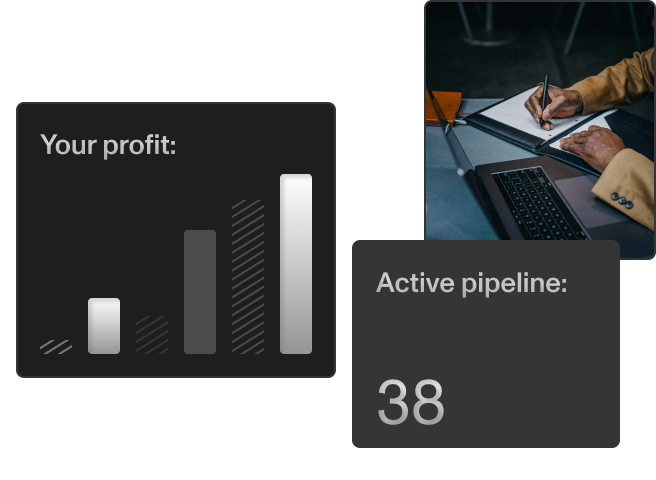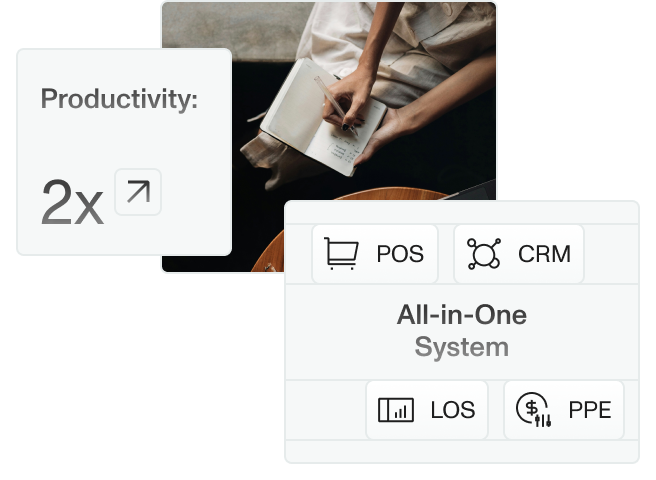Mortgages are embedded in the economy, providing a gateway to homeownership for buyers across financial strata. Before the emergence of modern mortgages in the 1930s, purchasing a home was primarily reserved for the wealthy.
In the 1800s, Americans typically had to provide a 50% down payment and pay off the mortgage in less than ten years. The situation altered with a string of changes in the 30s, including the creation of the Federal Housing Administration (FHA) and the Federal National Mortgage Association (Fannie Mae).
Since then, the market has evolved significantly, with mortgage industry trends shaping how mortgages get obtained. As an originator, staying on top of every twist and shift is part of the job.
The Evolving Mortgage Landscape
Unfortunately, economic pressures can stifle mortgage activity. This phenomenon unfolded in 2023, marked by stubbornly high interest rates, limited inventory, and rising inflation.
2023 has been called the “least affordable year for homebuying on record.” Over one-third of homebuyers under 30 used family money for their down payments. The tight market shrunk mortgage activity for low and middle-income buyers, particularly those with poor credit.
Mortgage originators who followed trends and explored mortgage market insights were better positioned to navigate the challenges of 2023.
The outlook seems brighter for 2024. Many experts expect interest rates to creep down and inventory to increase slightly, allowing home prices to drop. Still, originators need to remain flexible. Many homebuyers desire a digital experience and expect new features like mobile applications.
Unveiling Crucial Mortgage Trends
Thanks to technological advancements, digital lending will continue to grow in 2024. Lenders investing in digital tools and platforms will have a competitive advantage, making the loan process more efficient for themselves and their clients.
Specific trends to consider include:
1. Automated underwriting: The use of AI and automation in underwriting is expected to significantly increase as it allows for faster, more accurate decisions based on data.
2. E-signatures and digital closings: Expect this to become the norm. Digital processes reduce paperwork and also offer convenience and speed for borrowers.
3. Predictive analytics: With the help of machine learning algorithms, lenders can analyze data to identify patterns and make more accurate risk assessments.
4. Increased cybersecurity: New technology is available to scammers, too. Lenders will need to implement strict security measures such as encryption and two-factor authentication.
Demographic changes may interfere with the mortgage market as well. Younger generations are less likely to prioritize homebuying, limiting the client pool. To adapt, originators might consider expanding into other markets, such as refinancing.
Technological Innovations Reshaping Mortgages
Mortgage calculations used to be performed entirely by hand. As the industry grew, so did the technology until we reached the present era, where there is a suite of advanced tools designed to help mortgage lenders and originators.
Advancements in technology have changed everything, from automating underwriting processes to providing an avenue for on-the-go borrower communications. The impact of these technologies is so evident that adoption has been high, even though the mortgage industry is historically resistant to change.
Technology allows for smooth communication channels, faster processing times, and increased convenience. Moreover, tech adoption has reduced stress for both borrowers and lenders. Neither side wants to deal with endless physical paperwork and slow credit decisions.
Adapting to Change: Strategies for Professionals
More advancements in mortgage technology are coming- and it doesn’t matter if your business is ready. As an industry professional, you need to embrace new ideas. However, change can be challenging and even overwhelming at times. What strategies can professionals adopt to navigate these changes successfully?
1. Understand your market: Stay informed on current mortgage trends to anticipate future shifts in the industry.
2. Accept technology: Keep up with new tools and platforms, which doesn’t mean buying every new software tool for originators, but you should be willing to vet them and see if they fit into your operations.
3. Train employees on new technology: Ensure your team is well-equipped and knowledgeable about new technological innovations. Consider offering training sessions or workshops to keep everyone on the same page.
4. Develop a digital-first mindset: Recognize that more and more borrowers are looking for mortgages on their phones. Embracing technology can help you meet their expectations with features like mobile applications.
5. Foster a culture of innovation: Encourage creativity and forward-thinking among your team to continuously improve processes.
The Future of Mortgages: Looking Ahead
As mentioned above, the 2024 mortgage landscape looks more promising than the previous years. Some roadblocks keeping people from homeownership, such as high mortgage rates, will disappear, and home sales will likely increase.
Originators and lenders should be excited about the growth potential, but they should also stay vigilant. Understand how emerging technologies and changing market conditions will impact your business and proactively adapt to those changes to remain competitive.
A potential growth avenue for mortgage originators could be targeting a niche market, such as first-time homebuyers or those looking to refinance. By focusing on a specific demographic and personalizing their mortgage experience, you can differentiate your team from competitors and attract more business.
Possible obstacles include the declining interest in homeownership that we discussed earlier and that home prices have risen much faster than overall wages.
Conclusion: Staying Ahead in the Mortgage Industry
Modern mortgage trends are constantly evolving, and so must the industry stakeholders. Key ideas to remember include:
- Digital lending will continue to grow in 2024
- Technology advancements allow for faster closings and increased convenience
- Focusing on niche markets can help differentiate your business and attract more clients
By keeping these points in mind and continuously learning and adapting, you can position yourself for sustained success in the ever-changing mortgage industry. Be open to change, try new technology, and prioritize client expectations.
Schedule a demo to explore Sonar mortgage tech solutions.








